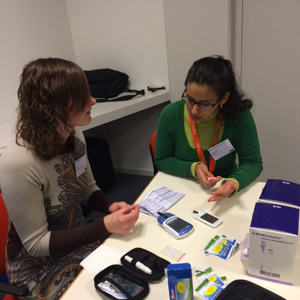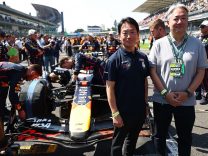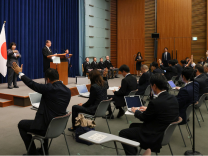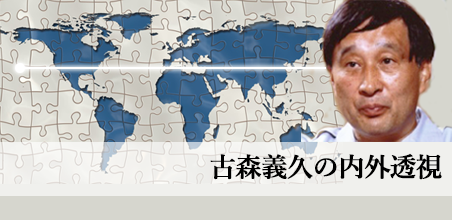[Hiroyuki ABE]Trying Smart testing devices that prevent heart diseases at early stage[Healthcare Tour in the Netherlands (Part.5)]

”japanese version is here“
Hiroyuki ABE (journalist)
Profile|Website|Twitter|Facebook
Medical Tour in the Netherland (Part 5)
Trying Smart testing devices that prevent heart diseases at early stage.
On Jan. 23rd, we visited another very interesting facility called the Netherlands Organization for Applied Scientific Research (below TNO). It was founded in 1932 by the Netherlands’ national assembly to facilitate scientific research and it represents the largest neutral general institute of its kind among European countries. Its employs 5000 people in 5 different departments: Healthy Living, Defense Safety & Security, Industrial Innovation, Energy and Environment, Mobility and Information. During our visit, we were taken to the Healthy Living Department.
Here they conduct demand-driven research on food and nutrition. As you read this, you might imagine laboratories filled with white-clad scientific people, but the reality is quite far from it. In fact, this institute is dedicated to support patients with chronic heart disease, which number is the most increasing in the Netherlands. It is said that past the age of 70, 20 to 30 % of humans struggle with some kind of heart trouble. In the case of the Netherlands, 1% of adults – about 130,000 people – are diagnosed with heart disease and the number is expected to increase to 190,500 by 2025.
For those patients, one big inconvenience is to regularly go to a hospital to undergo blood-tests as well as blood-pressure and weight measurements. The TNO is thus developing all sorts of self-measurement devices to reduce the number of hospital visits and encourage self-care. We were then presented with a demonstration of those devices.
The first on the list was the easy-to-use blood-testing tool. It takes a small blood sample from your finger-tip, then tells you your levels of cholesterol, sugars, and other important details that heart-disease patients need to know.Then came the 3D body-scanner, which can take all appropriate measurements, from height to waist, by only using a computer-imbedded camera.
At last, we were shown the blood-pressure reading device, with which you can easily measure your heart-beat and blood pressure. The results are automatically registered either in your computer or smartphone and you can then keep accurate record of your own condition.
All these devices allow still healthy early-stage heart-disease patients to do proper prevention to avoid their condition to worsen. Also, they allow chronic patients to detect automatically any anomaly and contact their doctor quickly. There is no more need for daily visits to the hospital and it lowers the burden on both patient and medical entity sides.
The next challenge will be first on how to guarantee the reliability of all the data collected. There will be hard work to do in order to decide the standards for all the applications and devices, as well as who and how those standards will be defined. Will it be the medical corpse or the private sector? There are debates about this matter.
Also comes the fact that if you decrease the number of patients’ visits to the hospital, you decrease that very hospital’s income. To face this problem, the institute is redistributing the time and manpower they used for testing and analyzing, to advanced healthcare R&D and clinic to increase its profitability. The TNO claims that even though it is a public institution, it has founded over 60 different businesses in cooperation with private pharmaceutical and food companies, as well as healthcare devices manufacturers, in order to reinforce its main purpose of protecting the health of the Netherlands’ citizens.
As I wrote in my previous article about the medical university, it seems to be a very Dutch thing to always keep business in mind. In Japan too, we are spreading the use of smart health-testing devices, but I don’t think the hospitals have had any deep thoughts yet about how to make use of the data for prevention or treatment. I really hope they tackle seriously this challenge soon.
【あわせて読みたい】
- 【滝川クリステルの動画番組】『今、何を考え、どう動くべきか』第二回
- どうも気になるオバマ政権の対日防衛政策〜いつまでもアメリカが守ってくれると思うな(古森義久・ジャーナリスト/国際教養大学 客員教授)
- 情報の洪水の中で「テレビが社会の羅針盤」になりえた時代は終わった〜テレビが出来ない事をインターネット・メディアは出来るのか?Japan In-Depthの挑戦(安倍宏行・ジャーナリスト)
- 日本に「出口」はあるのか〜「不良債権問題はないが、経済を成長させるエンジンの馬力がない日本」が陥る「長期停滞」のリスク(藤田正美・元ニューズウィーク日本版編集長)
- 外国人でも70万円で安楽死ができる国スイス〜最先端の安楽死制度を持ち、自殺幇助が合法のスイスには安楽死ツアーもある(磯村かのん・通訳/起業家)
- もしも警察に捕まったら!対応には要注意!|デイビッド・セインの“意外と知らない?!知っておきたい!英会話”(デイビット・セイン・英会話講師)




























